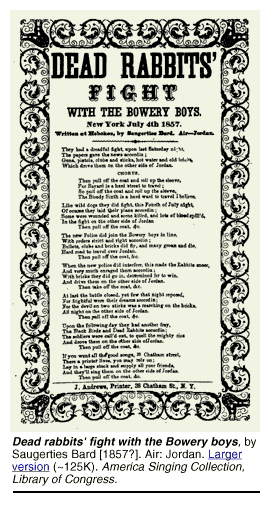
From the NEW YORK HERALD, Morning Edition – Monday, July 6, 1857.
THE FOURTH IN THE METROPOLIS
The Military Parade and Ceremonies in the
Park
Serious and Bloody Riots and Loss of Life
 | ||
OPERATIONS OF THE NEW POLICE
The Military on Duty in the Disturbed
Districts.
Accidents, Incidents and Stabbing Affrays.
ONE DAY’S ARREST
Scenes in the Park at Noon and at Night
THE FIREWORKS POSTPONED
The Celebrations Out of the City
Interesting Mormon Clam bake in Connecticut
DEFINING THEIR POSITION
&c.,
&c.,
&c.
___________________________________________
The Fourth is always a great day
in New York. It is always the noisiest of the year.
Saturday, owing to one or two serious riots, will be
remembered as noisier than any previous Fourth for several
years. We give pretty full descriptions of the scenes of
joy as well as the scenes of blood. Accounts of several
social gatherings we are, however, compelled to omit, in
consequence of the space occupied by the details of the
riots.
* *
* * *
*
Continuing:
TERRIBLE RIOTS IN THE METROPOLIS
The Sixth, Seventh and Thirteenth Wards In
Arms on the Fourth
THE STREETS BARRICADED
Bloody Fights between the Bowery Boys and
the “Dead Rabbits.”
Seven Men Killed and Thirty-Nine Wounded.
THE METROPOLITAN POLICE
BADLY BEATEN
THE MILITARY ORDERED OUT.
Three Regiments on Duty to Suppress the
Riots
The Origin and Progress of the Disturbance.
RENEWAL OF THE FIGHT YESTERDAY
MORE BLOODSHED.
Accurate List of the Killed and Wounded.
SCENES AND INCIDENTS.
&c.,
&c., &c.,
___________________________________________
The city was the scene of two or three
serious riots on the Fourth – one a bloody affair,
resulting in the death of seven men, and the wounding of
thirty-nine others. Fifteen or twenty arrests were made.
These disturbances occurred in the Sixth, Seventh and
Thirteenth Wards. That in the Sixth ward, the most
serious and bloody, was renewed last night, ending in the
injury of a dozen more, who were so badly beaten that they had
to be taken to the City Hospital. The police force not
being strong enough, three regiments of troops were ordered
out, and remained on duty last night.
_____________________
The bloody riot in the Sixth ward, by
which nearly a dozen men have lost their lives, and a large
number have been seriously wounded, appears to have originated
with the revival of an old feud between a party of rowdies,
called the “Dead Rabbit Club,” from the
neighborhood of Mott, Mulberry, Bayard and Elizabeth streets,
and a party of Bowery boys. As early as two o’clock
on Saturday morning an attack was made by the “Dead
Rabbits” on the drinking
saloons, No. 40 Bowery, which seems to have been the
headquarters of the Bowery boys, severely injuring a number of
the inmates, breaking the windows, and doing a good deal of
damage. The police of the Tenth, Thirteenth and Sixth
Wards were notified and succeeded for the time in quelling the
riot. The Metropolitan police were pretty roughly handled
in their attempt to restore order, as will appear from the
following return of Sergeant Hicks: -
A strong malignant feeling was
manifested in my district last night, by a large gang of
rowdies residing therein, against the Metropolitan police.
A special patrolman, named Thomas Sparks, received a cut
in the forehead while in a conflict with these rowdies in
Chatham street, near Mulberry. There was also
considerable fighting during the latter part of the night
between these rowdies and a party of men in the Bowery, near
the theatre. The reserve force at No. 88 White street was
turned out several times to suppress the row, but in every
occasion the rowdies had made good their exit. No doubt
their spies gave due notice that the police were coming.
The skirmishing, however, seems to
have been kept up at intervals throughout the day, though
assuming no very important aspect until about 4 o’clock
in the afternoon. At this time word was received at the
Superintendent’s office, No. 88 White street, that there
was a serious riot in the Seventh ward, and accordingly a force
of twenty-five men was detailed to proceed thence and suppress
the riot, under command of Sergeant Brower. This squad
proceeded up White street to Baxter (old Orange street), and
through Baxter to Bayard street, where, as they turned the
corner, as if by previous notice everything had been prepared,
they were met by a tremendous mob, armed with sticks, stones,
rifles, brickbats, and every imaginable weapon of assault.
The crowd commenced hooting and jeering, imagining that
the police were seat after them. Pretty soon the missiles
commenced to fly, and a rush was made for the police, who
fought as bravely as they could, but were at a great
disadvantage on account of the inferior a number. The
assailants were of every age, men and complexion, and projects,
their missiles from every quarter, from stoops, windows, and
even tops of houses, bricks, stones, tin pots and other objects
descended upon the unfortunate police, wounding many of them
severely. They, however, forced their way up Bayard
street, though they became much scattered. At the corner
of Elizabeth street, while the exasperated mob was at their
heels, ready to tear them to pieces, they met some members of
engine companies in the vicinity, and the Bowery boys, who
sided with them, and at some of them say, preserved
them from certain massacre. The feud between the Bowery
boys and the assailants became heightened at this point, and a
most terrible fight took place at the corner of Bayard street
and Elizabeth, the assailants being for the most part in
Bayard, Mott and Mulberry streets, and the police, under
Sergeant Brower, being with the Bowery boys in the Bowery,
Bayard and Elizabeth streets. Not only the most dangerous
missiles, but pistols and guns were freely used, and an
incalculable number of wounds of every variety were inflicted.
Word had meanwhile, been sent to the
Superintendent’s office that the police had been
attacked, and accordingly a force of forty men, under the
command of Sergeant Hicks, of the Sixth precinct, was sent to
their relief. These, consisting mostly of special men,
went down White to Centre street, through Centre, Franklin and
Baxter streets, where they came upon the assailants in the
rear, in Bayard street, where they would be hemmed in and
obliged to surrender, but the hurricane of missiles from the
tops of the houses told with fearful effect upon the police,
who had likewise to contend with a violent mob hand to hand.
They, however, fought bravely, though they had no
firearms of any consequence. Sergeant Hicks saw one man
throw a brickbat, and instantly rushed for him and collared him
with the design of having him taken to the Tombs.
The mob, however, gathered round him, as they cried,
“Take him away!” “Don’t let the sons of
b—s have him!” &c. The Sergeant was,
however, assisted by three or four officers, and, fortunately,
having a revolver, drew it pointing it at the threatening mob,
declared that whoever made an assault must die instantly.
His prisoner was therefore taken off to the Tombs.
The force fought bravely, and succeeded in carrying off a
large number of rioters to the Tombs, where they were locked
up. Their desperate situation, however, becoming known at
88 White street, a force of nearly one hundred men – all
that could be spared – was sent to the aid of the
Metropolitans, now fighting against fearful odds at Bayard,
Baxter, Mott, Mulberry and Elizabeth streets. The scene
at these points is said by those who witnessed it to have been
of indescribable confusion. The crowding, fighting mass
in the streets – the howling, shrieking women and
children in the upper floors busily engaged in showering every
description of missile on the heads of those below, hitting
indiscriminately friends and foes – the explosion of
firearms, amid the shrieks of the wounded and dying, rendered
the scene one of horror and terror.
